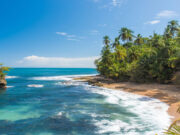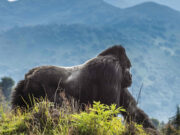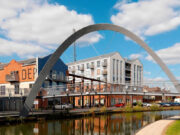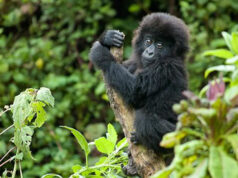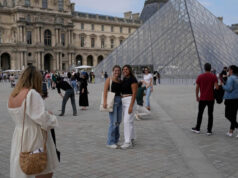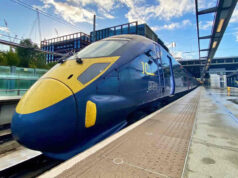Cruising down the auto-route, eastbound out of Paris, one sees huge billboards advertising Disneyland. Now make no mistake about it, I and my family visited Disneyland before, although the one in Orlando, Florida, rather than the one in France.
We have also unfurled the family flag at many other such amusement parks, both in the US and in Europe. And I particularly remember a great time at the huge water park outside Madrid.
In other words, we are not a morbid family. We like to enjoy ourselves. Even so, I have found that the most memorable of our family trips were to some of the darker places on earth.
One of the luxuries of being a writer is that you can quote yourself, and in TRAGIC SHORES, A MEMOIR OF DARK TRAVEL, I wrote that “there is much to be gained where much has been lost.”
I have found this to be particularly true with regard to the experience dark places offer to family life.
Over the years, my late wife, Susan Terner, and my daughter, Justine, came to understand the value of such places, and to seek them out.
Very early in our travels, we’d come to understand that it was at Lourdes we’d most felt the frailty of health, and at Auschwitz, the cruelty of history. These lessons shared were powerful and so we sought more of them.
And so in Africa, at Elmina, we passed through the Door of No Return together, knowing that had we been a slave family, we would have long since been separated, never to set eyes upon each again.
We spoke of slavery again at the stone quarry in Siracusa, our voices echoing through Dionysius’ Ear.
Outside Krakow, we made the harrowing descent into the salt mine at Wieliczka, as always, together, in a rickety wooden elevator, clinging to each other as we were lowered into a darkness within which untold generations of human beings had worked away their lives.
Where better to realize that unprocessed salt is black in more ways than one, and to do so as a family, learning and teaching together.
Over time, the bonds that united us in darkness seemed stronger than all others. We went to prisons, to death camps, to a home for mentally disabled children in Kumasi, to fields of battle from Waterloo to Anzio, as well as places, like the Alcazar, in Toledo, Spain, where a far more intimate tragedy was endured, in this case, by a loving father and his son.
The experiences were so powerful, and in their power, so deeply shared, that after our daughter Justine grew up and made a family of her own, Susan and I continued to find our most heartfelt moments in the dark places of the earth.
We went to Hiroshima and to Nagasaki, to the suicide cliffs of Okinawa, and to the leper colony on Molokai.
We walked the ghostly streets of Oradour-sur-Glane, preserved intact since the day its entire population was murdered by German soldiers, as well as the fallen ramparts of Machecoul, home to Gilles de Rais, the world’s first recorded serial killer.
On a rainy afternoon I will never forget, we silently toured the trenches of Verdun.
And what did we learn from such places? Many things, of course. For a place to move you, to make you feel your heart breaking and your eyes grow misty, it doesn’t mean that place is depressing.
In fact, for human beings, the act of sharing – particularly a shared empathy – is never depressing. In fact, both the moments we share such feelings, and the times we remember them, are among the most precious we can know.
During my wife’s long dying, we often recalled our travels. And, yes, there were times when we spoke of Disneyland and other such places.
But more often, we recalled the darkness that had so illuminated our life together.
The prison in Dublin, with its heart-rending stories, the American Cemetery in the Ardennes, so beautiful in its dignity, the island of Melos, whose entire population the ancient Athenians had either put to the sword or shipped off to slavery to name a few.
Even now, I recall Susan’s comment as she pondered the sparse, rocky nature of its landscape:
“Where could a mother hide her child?”
Not long ago, Justine, now 37, and a world traveller on her own, told me that she intended to do with her family what Susan and I had done for ours:
“I want to travel to those dark places with my own child,” she said.
Then she looked at me a little wonderingly, as if puzzled by the thought, and added:
“Strange, but compared to places like the Alcazar, I don’t much remember Disneyland.”
Strange, yes, but neither do I.



